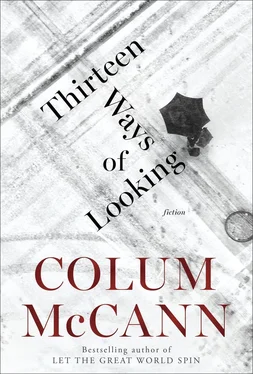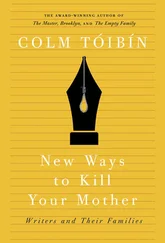A piece of leaf fell from his hair to the floor. She turned him around, looked at his back, his neck, his shoulder blades. He was unmarked. No cuts, no scrapes.
She looked down at Tomas’s trousers. Denims. Too large by far. A man’s denims. Fastened with an old purple belt with a gold clasp. Clothing from another era. Gaudy. Ancient.
A bolt of cold ran along her arms.
— No, she said. Please, no.
She reached for him, but he slapped her hand away. The door rattled again behind her. She turned to see Alan’s face: the stretched wire of his flesh, the small brown of his eyes.
— We need a male detective in here, she said. Now.
—
IN THE HOSPITAL IT was still bright morning and the air was motionless in the low corridors and muddy footprints lay about and the yellow walls pressed in upon them and the pungent odor of antiseptic made her go to the windows and the trees outside stood static and the seagulls cawed up over the rooftops and she stood in the prospect of the unimaginable — the tangle of rumor and evidence and fact — and she waited for the doctors as the minutes idled and the nurses passed by in the corridors and the trolleys rattled and the orderlies pushed their heavy carts and an inexhaustible current of human misery moved in and out of the waiting room every story every nuance every pulse of the city pushing up against the wired windows peering in.
—
THE WATER POURED HARD and clear. She tested its warmth against her wrist. Tomas came into the bathroom, dropped his red jumper on the floor, slid out of his khakis, stood in his white shirt, clumsily working the buttons.
She reached to help, but he stepped away, then gestured for her to leave while he climbed into the swimming togs. So, he wanted to wear shorts while she washed him? Fair enough, it was appropriate, she would let him.
The house was quiet again. Only the sound of the waves. She keyed her new phone alive. A dozen messages. She would attend to them later.
She returned to the bathroom with her hands covering her eyes.
— Ta-da! she said.
He stood there, pale and thin in front of her. The swimming shorts were far too tight. Along his slender stomach she could see a gathering of tiny, fine hairs that ran in a line from his belly button. He hopped from foot to foot and cupped his hands over the intimate outline of his body.
He had been untouched. That is what Detective Harnon had said. He was slightly dehydrated, but untouched. No abuse. No cuts. No scars. They had run all manner of tests. Later the detective had asked around the village. Nobody had come forward. There were no other clues.
They wanted him to come in for evaluation the following week. A psychologist, she said. Someone who might piece together everything that had happened, but Rebecca knew there’d never be any answers, no amount of probing could solve it, no photographs, no maps, no walks along the coastline. She would go swimming with him again, soon, down to the water. They would ease themselves into the shallows. She would watch him carefully negotiate the seastack. She would guide him away from the current. Perhaps some small insight might unravel, but she was aware that she could never finally, fully understand.
The simple grace of his return was enough. I live, I breathe, I go, I come back. Nothing else. I am here now, that is all.
Rebecca tested the water again with her fingers. She helped Tomas over the rim of the tub. Goose bumps appeared on his skin. His ribs were sharp and pale. He fell against her, stepped out. He groaned. The wet of his toes chilled her bare feet. She threw a towel around his shoulders to warm him, then guided him back toward the water. He placed both feet in the bath, and let the warmth course up through his body. He cupped his hands in front of his shorts once more. She put her hand on his shoulder and, with gentle insistence, got him to kneel.
He slid forward into the water.
— There we go, she said in Hebrew. Let me wash that mop.
She perched at the edge of the bath, took hold of his shoulder blades, ran a pumice stone over his back, massaged the shampoo into his hair. His skin was so very transparent. The air in his lungs changed the shape of his back. She applied a little conditioner to his scalp. His hair was thick and long. She would have to get it cut soon.
Tomas grunted and leaned forward, tugged at the front of his bathing shorts. His shoulders tautened against her fingers. She knew, then, what it was. He bent over to try to disguise himself against the fabric of the shorts. Rebecca stood without looking at him, handed him the soap and the sponge.
Impossible to be a child forever. A mother, always.
— You’re on your own now, she said.
She moved away, closed the door and stood outside in the corridor, listening to his stark breathing and the persistent splash of water, its rhythm sounding out against the faint percussion of the sea.
1
She is falling, ever so faintly, into age. It is not the slowness of rising in the morning, or the weariness of eyesight, or the chest pains that appear with more and more regularity, but the brittleness of memory that disturbs her now — how the past can glide away so easily, how the present can drift, how they sometimes collide — so that when she sees her torturer on television, she is not sure if her imagination is playing tricks, or if he has simply sifted through the sandbox of memory, slid headlong down the channel of thirty-seven years to tease her into a terrible mistake, or if it is truly him, appearing now on the late Spanish-language news, casual, handsome, controlled.
A crisp blue shirt with an open neck. His teeth white against the dark of his skin. A poised offhandedness to the manner in which he holds himself, at a conference, with several others, a row of microphones set up in front of them.
His appearance is so sudden at the tail end of the news that she pulls back sharply in her armchair, startling the two other Sisters on the couch.
Beverly holds her hand in the air to reassure them: All right, sorry, only me, go back to sleep.
She leans to turn up the volume on the remote but his image is gone, the report tailing off, a young blonde reporter staring confidently into the camera. A shot from along the river Thames. How is that possible? Perhaps she has garbled the images, confused the reports? The geography alone is too dizzying to contemplate.
The slippages of memory have happened so much recently. Mangled sentences, mislaid keys, forgotten names. Rainshowers of words, then drought. Only last week, she got lost on a walk along the beach in the bay, took the wrong path out of the dunes, the wind whipping the grass around her feet. Three miles from the house, she had to ask someone to phone a cab. Even then she couldn’t remember the exact address.
Too many uncertainties, so that even the absolute certainties — the day of the week, the tie of a shoelace, the rhythm of a prayer — have been called into question. And yet there’s something about the man’s face — if only for a split second — that sluices a sense of ice along the tunnel of her spine. The one brief close-up. The way he held himself on the screen, amidst a line of dignitaries. What was it exactly? The peculiar poise that age had brought upon him? The access to the microphones? The flagrant manner of his reappearance? The single quick close-up?
Her torturer. Her abuser. Her rapist.
—
IN THE HALF-MOONLIGHT AT the back of the house, Beverly reaches into her cardigan pocket for her lighter.
She is the only smoker amongst the Sisters. An ancient habit from her childhood in Ireland, she has carried it with her all these years: Belgium, Marseilles, Colombia, Saint Louis, Baltimore, the girls’ home in Houston, and now the southern shore of Long Island.
Читать дальше












